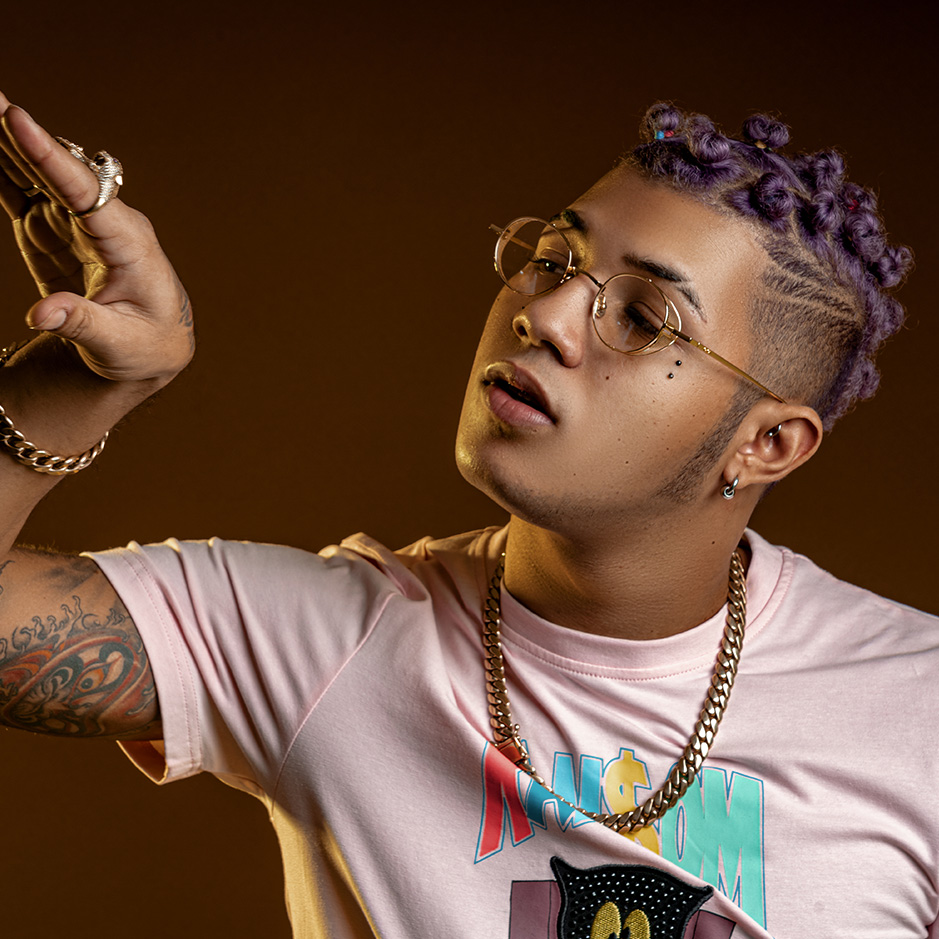A quick “Boza” browse on Spotify will lead you to a rare one-size-fits-all experience: Between the psychedelic house music of an ‘80s DJ, you’ll find Panamanian artist Boza’s sweet and smooth odes to fleeting love, savage sayonaras to bandit lovers and confident lures from “el p*to más cabrón que has encontrao’.”
“I say things most people wouldn’t dare to,” Boza (born Humberto Ceballos) tells Remezcla in Spanish. “Most people don’t accept, or see, their defects. They don’t see who they are; they have a lot of feelings and things bottled up but don’t dare to express it because of shame or fear, who knows, but I don’t… If I’m happy, I sing my joy and if I’m sad, I sing my sadness—in a very meticulous way.”
I say things most people wouldn’t dare to.
On his official debut studio album, Boza and his producer Faster prove their malleability lyrically and sonically respectively, with a synchronicity that comes from nearly a decade of working together and a foundation of mutual trust. A needed follow-up to notable singles like “Ratas y Ratones” and “Me Mató,” Más Negro Que Rojo builds on Panama’s continued commercial undertaking of their suave breed of reggaeton, reggae en español and dancehall, known as canela. Artists from the small Central American country of ~4.3 million people made mighty contributions to what is now known as urbano music, or el movimiento, yet was largely left out of the spotlight—until recently.
A refreshing hybrid of the new and old blueprints of the genre, often heard loud and proud on the streets of Panama in an iteration filled with jerga (slang), is further digestible and stretched here—a singular and fresh lifeline to urbano’s increasingly bland DNA that, with the likes of Boza and Sech, is finally making space for the isthmus and opening doors for other young talent. From the bouncy pop on “Hola” to the hopscotch, guitar-carried tropical feel of “Hecha Pa’ Mi,” Boza is here and evolving.
“Music is about finding yourself,” the Ciudad de Panama native says. “Finding your style, formula and, little by little, evolving.” His process began at age 16 and is ongoing. “About three years ago, I changed my approach to my lyrics and I found myself,” he recalls. “I found my sound.”
With a baby face and 23-going-on-40 serenity and maturity, Boza taps in for a virtual chat from Miami—a growing enclave and home to reggaeton artists beckoning new blood with remote possibilities for syncing in (often exclusive) collaborative incubators within the urbano space. From quick photo opps with greats like Carlos Vives to collabs with others on the rise like Dalex and Beéle, Boza’s found a second (temporary) home—both physically and artistically.
In April of 2020, the artist signed to Sony Music and worked to expand his EP Sonrisas Tristes and further develop his look and feel. His talent was evident prior to that shiny resume addition, and many—including his mom, Faster, Central America’s radio waves and the likes of streaming platforms like Spotify—were keenly aware.

“We talked to several people [in Panama] to determine new acts we wanted to push [for our global emerging artists program, RADAR, which Boza is a part of] and Boza’s name came up in several conversations,” Maykol Sánchez, Artist and Label Partnerships Business Lead for Latam at Spotify, says. “Even though he was already on our radar, this confirmed he was someone to watch.” Even prior to that, early hits like his sultry, staple track “Lollipop” from 2019 signaled what was coming.
“He has always had strong lyrical delivery and that was what caught my attention back at that time,” José Nova, Editor for Latam at Spotify, says thinking of the rising star’s slow but steady ascension, even as an independent artist. “He left his mark on the local scene. Between promoters and label executives, Boza was continuously the talk of the city.”
The ride to this moment has included music writing from a jail cell in 2015.
“Getting a young man from the street is like [working with] a lion,” Faster says jokingly, thinking of when he first met Ceballos as a teen. “But I implanted ambition in his mind—I told him ‘You can achieve a lot. You can be a millionaire,’ this this and that—and he really got it and understood what he could attain and what was within his reach.” The producer and manager describes the now somewhat tamed lion’s growth as the climbing of stairs—always improving.
In his official debut, Boza asserts himself as an intrepid lyricist with jawns that fall within the movimiento’s spectrum, but don’t bother calling him a reggaetonero or urbano artist.
I like to innovate.
“No,” he says, before the question of whether he would opt to be labeled as such fully escapes me. “That’s what I’m seen as… and if I have to do it, I’ll do it, but I want to be known as a divergent artist,” he decides. “There’s no defined genre [for me],” he says before sharing the relished review of his dreams: “este hombre se mete en la pista y la parte.” This man gets on stage and crushes it.
Although he’s yet to give the tracks their due with live performances, Boza’s already got his next LP ready to go, and is hard at work on more. So far, since his debut album’s release in July of 2020, the artist has amassed a healthy following and landed a spot on Billboard’s Hot Latin Song Chart and Spotify’s Top (Global) 200 at #17.
“We still have a long way to go,” Faster says, and Boza agrees. “I flow. I like to innovate and never stay in one place. You can see me with purple hair and braids today and tomorrow I can have a buzz cut in a different color; one day I can sing reggaeton and jump to R&B or afrobeat the next. You’ll never hear the same thing from me,” Boza promises. “You’ll never feel the same thing with each song.”







